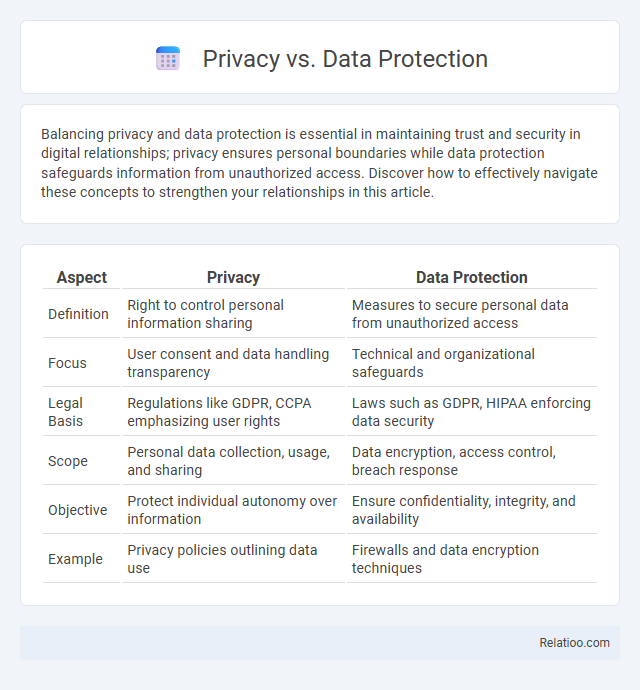Balancing privacy and data protection is essential in maintaining trust and security in digital relationships; privacy ensures personal boundaries while data protection safeguards information from unauthorized access. Discover how to effectively navigate these concepts to strengthen your relationships in this article.
Table of Comparison
| Aspect | Privacy | Data Protection |
|---|---|---|
| Definition | Right to control personal information sharing | Measures to secure personal data from unauthorized access |
| Focus | User consent and data handling transparency | Technical and organizational safeguards |
| Legal Basis | Regulations like GDPR, CCPA emphasizing user rights | Laws such as GDPR, HIPAA enforcing data security |
| Scope | Personal data collection, usage, and sharing | Data encryption, access control, breach response |
| Objective | Protect individual autonomy over information | Ensure confidentiality, integrity, and availability |
| Example | Privacy policies outlining data use | Firewalls and data encryption techniques |
Understanding Privacy and Data Protection
Privacy refers to your right to control personal information about yourself, ensuring it is collected and used according to your preferences. Data protection involves the technical and organizational measures implemented to secure personal data from unauthorized access, loss, or misuse. Understanding the distinction between privacy and data protection helps you safeguard your personal information while complying with legal requirements.
Key Differences between Privacy and Data Protection
Privacy centers on Your rights to control how personal information is collected, used, and shared, emphasizing individual autonomy and consent. Data protection involves the technical and organizational measures implemented to safeguard that data from unauthorized access, loss, or breaches. The key difference lies in privacy being a broader principle concerning personal rights, while data protection specifically addresses the security mechanisms ensuring those rights are upheld.
Legal Frameworks Governing Privacy and Data Protection
Legal frameworks governing privacy and data protection, such as the General Data Protection Regulation (GDPR) in the EU and the California Consumer Privacy Act (CCPA) in the US, establish strict guidelines for collecting, processing, and storing personal data to safeguard individual privacy rights. Privacy laws focus on individuals' rights to control their personal information, while data protection regulations enforce organizational responsibilities to secure personal data against unauthorized access and breaches. These legal frameworks mandate transparency, consent, and accountability, ensuring compliance through penalties and empowering individuals with rights like data access, correction, and deletion.
The Importance of Personal Data Privacy
Personal data privacy ensures individuals maintain control over their sensitive information, preventing unauthorized access and misuse. While data protection encompasses the technical and organizational measures to safeguard data, privacy focuses on the rights and consent of the data subject. Emphasizing personal data privacy is crucial in building trust, complying with regulations like GDPR, and protecting individuals from identity theft and discrimination.
Common Data Protection Strategies
Common data protection strategies include encryption, access controls, and regular audits to safeguard personal information and ensure compliance with privacy regulations. Privacy focuses on your right to control how your data is collected and used, while data protection encompasses the technical and organizational measures implemented to secure that data. Emphasizing strong authentication protocols and data minimization principles helps balance privacy concerns with robust data protection practices.
Privacy Challenges in the Digital Age
Privacy challenges in the digital age revolve around the increasing collection, storage, and sharing of personal data without explicit consent, exposing individuals to risks like identity theft and surveillance. Data protection laws aim to safeguard your sensitive information by enforcing strict regulations on how organizations manage and secure data. Navigating the balance between privacy and data protection demands heightened awareness of digital footprints and proactive measures to maintain control over your personal information.
Data Breaches and Their Impact on Privacy
Data breaches expose sensitive personal information, significantly compromising individual privacy by enabling unauthorized access and misuse of data. Effective data protection strategies involve encryption, access controls, and regular security audits to minimize vulnerabilities and prevent breaches. Privacy concerns intensify as breaches can lead to identity theft, financial loss, and erosion of trust in organizations handling personal data.
Technologies Enhancing Data Protection
Technologies enhancing data protection focus on encryption, access controls, and secure data storage to safeguard personal information from unauthorized access. Privacy centers on individuals' rights to control their personal data, while data protection enforces legal and technical measures to ensure data confidentiality and integrity. You can leverage advanced cybersecurity tools like zero-trust architecture and AI-driven threat detection to strengthen your data privacy and protection frameworks.
Best Practices for Safeguarding Privacy
Effective privacy safeguards rely on a combination of data protection measures, including encryption, access controls, and regular audits to prevent unauthorized data exposure. Implementing privacy-by-design principles ensures Your personal information is handled with the highest standards, minimizing risks from collection to storage. Best practices emphasize transparency, consent management, and continuous monitoring to maintain compliance with privacy regulations and protect sensitive data throughout its lifecycle.
Future Trends in Privacy and Data Protection
Future trends in privacy and data protection emphasize the integration of artificial intelligence and machine learning to enhance data security and compliance. Regulatory frameworks are evolving to address emerging technologies like IoT and blockchain, ensuring your personal information remains safeguarded amidst increasing digital interactions. Enhanced encryption techniques and decentralized data storage solutions will play critical roles in fortifying privacy protections moving forward.

Infographic: Privacy vs Data Protection
 relatioo.com
relatioo.com